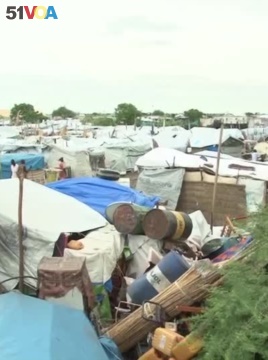July 09,2014
MALAKAL, SOUTH SUDAN — Floods, malaria and malnutrition are making life worse for internally displaced people staying at camps in South Sudan. In Malakal, the country's second largest city, most people prefer to face difficulties at the U.N. camp rather than return home, where the security situation remains fragile.

At a U.N. camp outside Malakal about 20,000 people are crammed in makeshift shelters. They fled the city, a few kilometers away, after fighting broke out in December between army and anti-government forces.
The health conditions are poor for many here, and they are likely to get worse as the rainy season starts, says physician Belem Caminoa, with the aid group Doctors Without Borders.
"They get flu, common colds, and then if they are malnourished, it's easy to get a severe infection, low respiratory and lung infection, and they become very, very weak. And then diarrhea for sure, because when it's raining, the water stays for days so half of them have diarrhea," explains Dr. Caminoa.
Flooded tents
At this time of year in Malakal, people suffer from scorching heat one day and flash floods the next. So living in tents become unbearable.
Tibisa Deng and her children have been at the camp since January. She says despite the camp's poor conditions, she is unwilling to move back to Malakal even though it's been under government control since April.
"I'm scared to go back because all the soldiers stay there. And they are waiting for war," she said. "And some soldiers kill civilians. If the war breaks, I won't be able to flee fast enough because I have small children. "
A few meters Emilio's shelter is flooded.
"The beds are in the water. People cannot sleep at night," he said. "Many people stay on the chairs until morning. You can get sick. This water is contaminated. There are diseases."
A grim journey
Sometimes Emilio, makes the grim journey back to see what is left of his house.
A few meters off the road, not far from the U.N. camp, victims of the war decompose in the open air.
Along the road, an unusual number of people appear to be leaving the town. Some say they heard gunshots south of town.
Emilio, a teacher, shows what used to be his house.
"This is the house where I live with my family before I run to UNMISS place. We left everything here, and all this thing got looted. There was life. Now there is no life at all."
Malakal has become a ghost town. Most buildings have been destroyed or looted and mostly soldiers inhabit the ruins. The once busy market is now empty.
"We don't want be in the UNMISS camp," said Emilio. "If there is peace, a lot of IDPS, they will all come back, again to their houses. If the government is serious to maintain peace."
The U.N. is building new camps at the compound to provide better living conditions. What is unclear is when people here will be able to find peace outside these gates, so they can rebuild their lives back home.